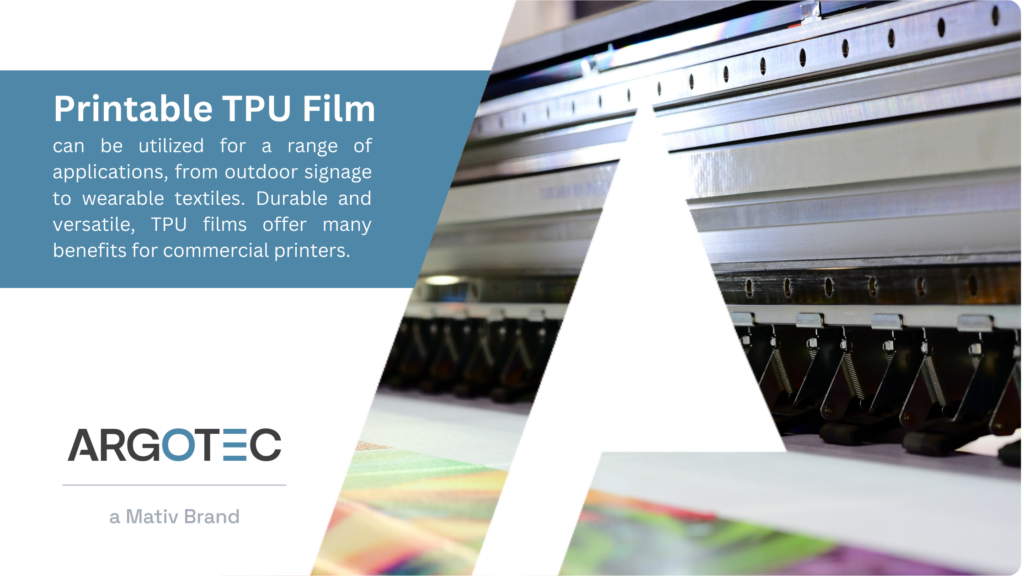
For commercial printers, your print media selection is crucial to the quality and performance of the final printed material. In recent years, thermoplastic polyurethane (TPU) films have grown increasingly popular in commercial printing. From the movement away from PVC to the ease of processing, printable TPU films provide a variety of technical aspects suitable for a wide range of printing applications.
What is TPU?
TPU is a type of polyurethane, a polymer composed of organic units joined by urethane links. At a molecular level, TPU is a segmented block copolymer. This means TPU contains both soft segments that provide elasticity, and hard segments for strength and thermal stability. When extruded into film, the unique chemical structure of TPU allows for both rigidity and flexibility. This combination of properties contribute to both the durability and printability of TPU films.
Adhesion Properties of TPU Film
The surface energy of printable TPU films is conducive to good adhesion. This means the film can be easily wetted by inks, ensuring that the ink spreads evenly across the surface. TPU films also have a natural affinity for certain inks due to their chemical composition. This creates a strong bond between the ink and the film substrate. To further enhance adhesion, TPU films can undergo surface treatments such as corona or plasma treatment to increase their surface energy and improve ink bonding.
Printability Considerations of TPU
Easily printable, TPU films are compatible with a variety of inks including solvent-based, UV-curable, and latex inks. This versatility means printers can use TPU films for different printing technologies and applications. The smooth and uniform surface of TPU film also promotes consistent ink deposition, resulting in high-quality prints, vivid colors, and sharp details. Finally, because the controlled absorption characteristics of TPU films allows the ink to dry quickly without bleeding, the final output provides a precise and crisp print outcome.
Mechanical Properties of TPU Films
The inherent flexibility and stretchability of TPU films make them ideal for applications that require the printed material to conform to curved surfaces or endure stretching without cracking the print. Resistant to abrasion, chemicals, and solvents, prints on TPU film maintain their integrity and appearance over time even in extreme conditions. TPU films can withstand high temperatures without deforming. This is important for printing processes that involve heat, such as thermal transfer, or when using heat to cure inks.
TPU Films and Environmental Factors
TPU films provide strength and durability, maintaining their quality even in the harshest of environments. Printable thermoplastic films offer UV resistance, which helps prevent the printed colors from fading or yellowing when exposed to sunlight. These specialty graphic films are also water resistant, which ensures that the prints are not affected by moisture or humidity.
Partner with Argotec For High-Performance Printable TPU Films
The science behind the printability of TPU film is rooted in its unique chemical composition, surface properties, and mechanical characteristics. TPU films provide commercial printers the ability to produce durable, high-quality prints that can withstand the demands of a range of commercial graphic applications, from outdoor signage to wearable textiles. The versatility and performance of TPU films make them a preferred material for printers looking to deliver top-notch products to their clients.
Ready to learn more about graphic films? Contact our team today!


